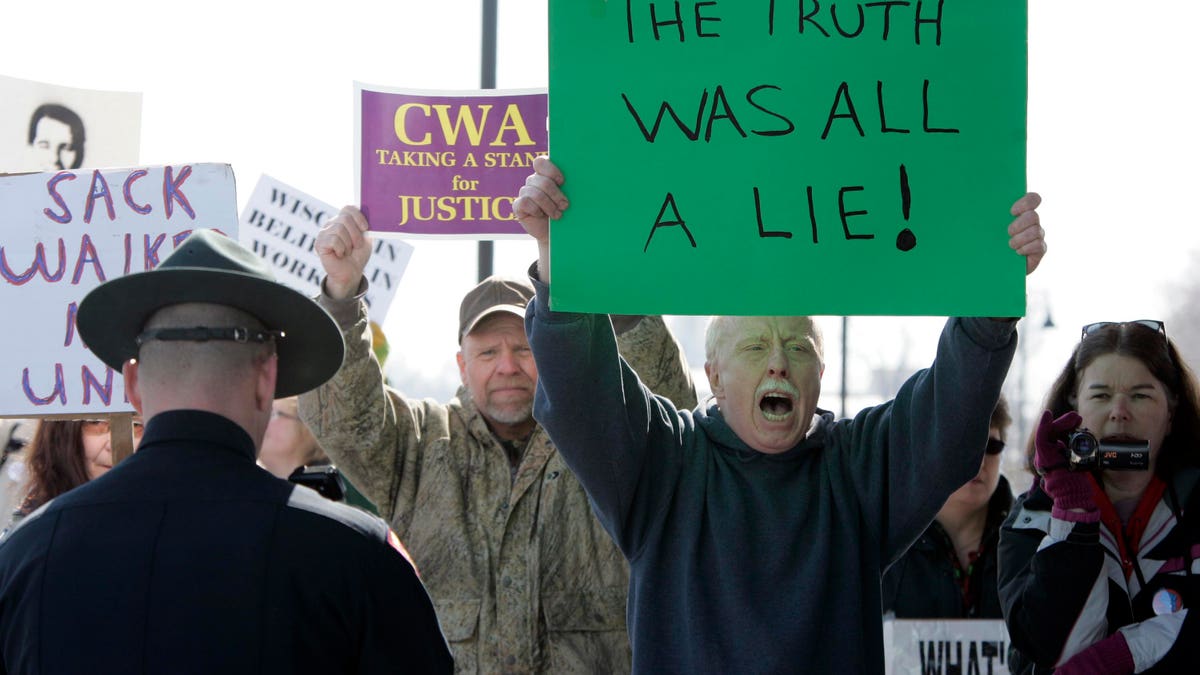
Dan Schierl of Neenah, Wis., second from right, joins other protesters during Gov. Scott Walker's announcement from the Fox Cities Trestle Trail over Little Lake Butte Des Morts Thursday, March 31, 2011 in Menasha, Wis. (AP) (Sharon Cekada, The Post-Crescent)
A judge who ground to a halt Wisconsin's collective bargaining law by declaring it not yet in effect returns to her courtroom Friday for the next round in the battle of the Badger State over the rights of state workers to negotiate their pay and benefits.
Dane County Circuit Judge Maryann Sumi was hearing testimony on Friday on allegations that Republicans violated the state's open meetings law during the dramatic buildup to passage of the legislation this month.
It's unclear whether Sumi, who ruled Thursday that the union bill hadn't been properly published, will make a decision immediately after arguments, but any decision is nearly guaranteed to unleash a flurry of appeals that could stretch to the state Supreme Court.
After Sumi's ruling on Thursday, Republican Gov. Scott Walker's administration reluctantly suspended efforts to enact the law, which requires most public workers to pay more for their health and retirement benefits and severely limits their collective bargaining powers. The legislation is expected to save the state $30 million by July, when a new two-year budget would go into effect.
But as the court trials wear on, some members of the State Employees Union are turning their attention elsewhere -- to businesses who've stayed on the sidelines during the dispute.
A letter from Council 24 of the American Federation of State, County and Municipal Employees threatens those businesses with a boycott if they don't display a sign of support in their window.
Jim Haney from the Wisconsin Manufacturers & Commerce, a business association of nearly 4,000 members including manufacturers, service companies and local chambers of commerce, called the union's letter "appalling" and likened it to protection rackets in Chicago.
"To say if you pay a price, if you put up a sign, if you reject your own personal values and say that you'll support us regardless of what we want to do is just un-American," Haney told Fox News. "And it's appalling how organized government unions, monopolistic government unions can engage in these kind of bumbling tactics."
Jim Parrett, a field representative for the AFSCME's local union, signed the letter. He told the Milwaukee Journal Sentinel that he has gotten threatening phone calls since the letters were distributed as well as calls of support.
GOP state lawmakers have also received threats. A Wisconsin woman has been charged with sending two emails to senators threatening to shoot them and plant bombs around their homes.
The criminal complaint filed by Dane County District Attorney Ismael Ozanne charges Katherine Windels, 26, with two felony counts of creating a bomb scare and two counts of threats to injure or harm. The penalties incude up to three years in prison for the bomb scare charges.
But Ozanne is also leading Democratic and union lawsuits against the legislation. Ozanne alleges Republicans didn't provide the proper public notice when it convened a special committee to amend the plan before its passage.
Sumi earlier issued an emergency restraining order blocking the secretary of state from publishing the bill while she considered the case, but Republicans persuaded the Legislative Reference Bureau to publish it, raising questions about whether the law was in effect. Sumi settled that with her ruling early Thursday morning.
State Justice Department attorneys contend the Senate's internal rules trump the open meetings law. Sumi's authority is limited to constitutional questions; an open meetings violation doesn't rise to that level, they say. Plus, they argue, Ozanne can't sue Republican legislators because state lawmakers are immune from civil actions while the Legislature is in session.
Republicans also must contend with lawsuits from Dane County Executive Kathleen Falk and a group of public sector unions, both of them arguing the law still contains fiscal components -- meaning the Senate needed a full quorum to vote.
The union law has been a flashpoint of contention since Walker introduced it in mid-February. Under the law, most public sector workers must contribute more to their pensions and health care, changes that amount to an 8 percent pay cut. The measure also prohibits them from collectively bargaining on all work conditions except wage increase up to the rate of inflation.
Walker has said the law is needed to help the state balance a $137 million deficit and give local governments enough flexibility with their employees to withstand deep cuts in state aid coming in the next two-year budget.
On Friday, the state's Legislative Fiscal Bureau released an analysis saying that the budget repair bill that is scheduled to pass next week with Democratic support will balance the budget, making up a $137 million shortfall. The LFB said the bill works even without the additional contributions from state workers this fiscal year.
The Associated Press contributed to this report.












































